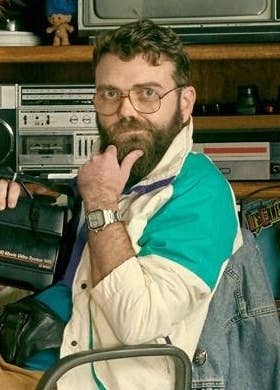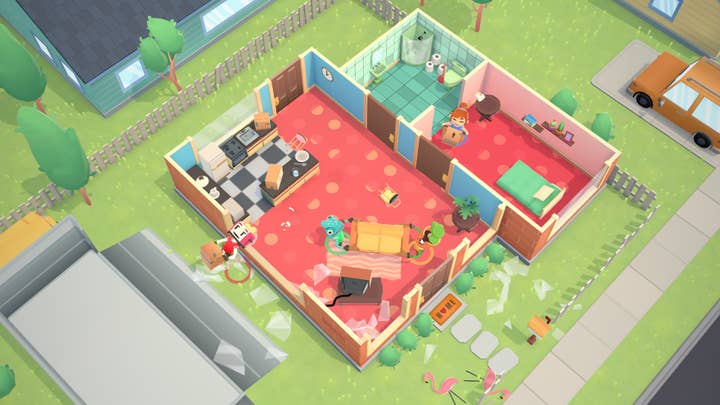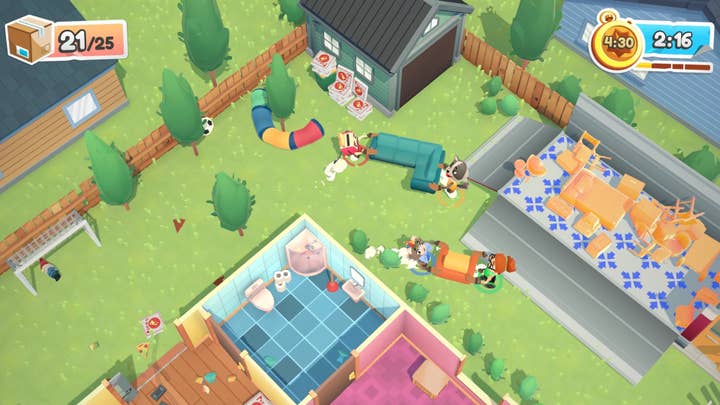SMG Studio: Platform holders need to drive accessibility
CEO Ashley Ringrose hopes Moving Out's difficulty-adjusting Assist Mode will inspire developers to be more inclusive
In recent years, a handful of major games companies have been praised for including accessibility options, enabling a broader range of players to enjoy their titles.
From Insomniac's extensive options in Marvel's Spider-Man to Microsoft's work on the Xbox Adaptive Controller, there have been some notable advocates for making video games easier to play for people with different cognitive and physical abilities -- or even just a smaller screen.
But they remain the exception rather than the rule, and Ashley Ringrose, CEO of Australian indie SMG Studio, encourages more developers to prioritise adding accessibility options to their games.

"Games are already hard to make on time, and for some accessibility options might be in the 'nice to have' basket, and therefore could be the first to get cut," he acknowledges. "If you try and implement many of these features late in the development process, it can become very difficult to achieve. If you've already been working on a game for three years and then want to change how the UI is coded it could be almost impossible.
"However, I'm hopeful games that have started their development cycle in the last 12 months and are coming out in 2020-plus will have more of these features implemented. My personal view is that if there were more requirements from the platforms we'd see huge changes. If you couldn't pass certification unless a core set of accessibility features had been implemented, then everyone would fall in line."
Ringrose and his team are soon to demonstrate their own take on accessibility with the upcoming release of Moving Out, which will be published by Team17. This madcap co-op game challenges players to transport furniture and other household objects together through various hazard-filled levels.
The game features an Assist Mode, which enables players to customise various aspects that contribute to difficulty. Options include everything from extending time limits and skippable levels, to reducing the amount of danger a level presents or making certain challenges simpler -- for example, having items disappear when they enter the removal van rather than having to stack them properly.
"The goal for us is to allow anyone, of any ability, to play and enjoy Moving Out," says Ringrose. "Importantly, this means nothing is locked out to players who enable Assist Mode -- even trophies and achievements."
"If you couldn't pass certification unless a core set of accessibility features had been implemented, then everyone would fall in line"
The mode, a by-product of the user testing and game balancing process, was introduced roughly halfway through development. When debating whether to make certain sections harder or easier to complete, the team reasoned that this choice should really be given to the player. If someone is struggling, they can either persevere or enable Assist Mode options to ease their progress.
"This doesn't mean we tuned the main game to be super challenging and hard," Ringrose notes. "We tuned it for fun, but for some it might go from 'fun' to 'argh,' so we give them the Assist Mode to stay having a fun experience.
"We have a lot of parents in the studio, and when you try and play a game with a five to seven year-old it's a completely different experience compared with an eight to ten year-old, or a young teen. The same goes for those who don't normally play games or have less ability, so by adding the Assist Mode we're opening up the game for everyone."
SMG Studio took care to avoid gating the main content -- it's possible to finish the game regardless of whether you use Assist Mode. But then there are bonus objectives and tougher time challenges for those who want a 'pure' experience.

Adding the option to adjust time limits was easy to implement, as was making objects lighter so they can be carried by one player rather than two. The biggest challenge for the team was reducing the level of environmental hazards, as it meant every level had to be reviewed and adjusted.
"Some levels - especially the earlier ones - had no such danger, but with later ones where the game's difficulty ramps up with the introduction of the platforming elements, it was a matter of slowing them down and adjusting the things that 'kill you,'" Ringrose explains. "The biggest discussion we had was if players should still be able to unlock the bonus levels, but we were determined to avoid having a certain percentage of gamers miss out on those experiences."
"[UI text] has to change in the future. It's such a front-facing issue and affects everyone who doesn't play on a monitor on their desk"
Accessibility does not just apply to mechanics, of course. SMG Studio has gone to great lengths to ensure all aspects of the game can be customised for those who need them, with scalable text and on-screen button prompts, different in-game fonts for dyslexic players, and various ways to convey information through a mix of text and symbols -- none of which are colour-dependent.
In-game text size is increasingly an issue, particularly in some AAA games where the fonts can be tiny, even on larger screens. Some developers, such as The Outer Worlds creator Obsidian Entertainment, fix this in patches months after launch, but Ringrose is keen to see this addressed during development.
"Maybe too many devs play using a big screen on their desk," he suggests. "My guess is the bigger the studio, the harder it is to get key stakeholders together in the same room and discuss it. UI designers might have ideas, but it's passed on to the UI developers and their focus is on that element. In games development, one question that's asked is, 'Does it work?' So everyone reviewing the game throughout the development process says, 'Yep, the UI works for me,' instead of asking, 'Will this work for everyone or people playing on a TV six feet away?'
"This has to be something that changes in the future. It's such a front-facing issue and affects everyone who doesn't play on a monitor on their desk."

Controls are also a factor. Moving Out is fully remappable on PC, and there are various gamepad schemes for consoles, as well as the option to choose whether buttons need to be held or toggled when interacting with objects. SMG is by no means the first team to prioritise such considerations, but Ringrose encourages even more to do so.
"A great resource for us during development was the Games Accessibility Guidelines and the teams at SMG Studio and [development partner] DevM really can't thank the people who put this website together enough," he says. "We may have missed some things along the way, but I know we'll be able to address any issues with future updates to the game."
Inevitably when the subject of accessibility comes up, there's a vocal minority that argue making games more accessible takes away the challenge they so desperately crave. But, as always, it's important to emphasise that more accessible does not mean easier for everyone -- just those that really need it.
"It's less about 'easy' or 'hard' and more about 'is it fun?'" Ringrose says. "For instance, is the game fun for little kids and grandparents to play together? Thanks to the implementation of our Assist Mode options, that's an absolute yes. By having such options available it allows the people who want the so-called 'hardcore' Moving Out experience to stay pure. Thinking about it now, we should add a 'Hinderance' mode that includes options to make the game harder."









